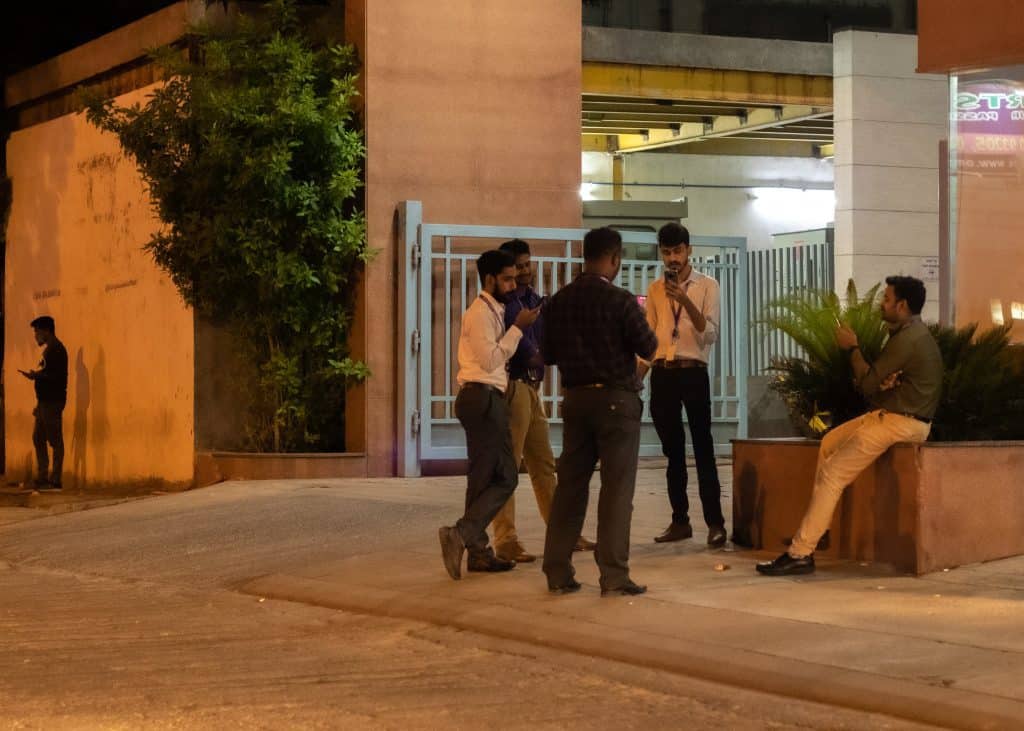While we are comfortably snuggled in bed, perhaps listening to some calming music to relieve the stress of the day, there’s a fellow citizen out there on the streets, plugging in his earphones so that he doesn’t fall asleep! Sometimes, just when he thinks he can retire for the night, the phone beeps and he’s on his way again. It’s true the city never sleeps — and among the myriad workers who keep the nocturnal economy of the city running, food delivery executives constitute a prominent group today.
It was 1:30 AM on this particular night and a troop of delivery executives were mustered together near Moonlight take-away and Delivery restaurant. One of the few restaurants on Old Mahabalipuram Road (OMR) which services till 5 AM. “Most of us work part time. This is one way of earning some extra money. Night shift also comes with additional incentives which makes it viable” says a delivery executive waiting for an order.
On shift timings
Siva, a newly joined delivery executive tells me, “After my day job, I get home and get some sleep before my shift starts. I work from 5 PM to 2 AM. Between 7-11 pm are peak hours where the incentives are high. I clock anywhere between 25-30 kms in a day. Usually after 11 PM the orders slow down and that is when we get some breath to catch. I don’t want to fall asleep hence I listen to music to keep myself awake. Once it was 2 AM and I was heading home and just as I was nearing my house I got an order request. I fulfilled that”
Each delivery executive has a designated zone and orders are assigned to them in that zone alone. Sometimes during festive seasons there’ll be shortfall in the number of executives and during those days the executives deliver beyond their zone but otherwise the operations are clearly segregated. “Some delivery executives who’ve been waiting for a longer duration do not get an order but someone who’s just arrived at a location gets it. This does result in some infighting but these are very rare. There’s an understanding between the executives and that is what keeps the business going”.
Cops are your friends?
“Most of the times the cops harass us by either chasing us away from our location or asking for random papers of the vehicle. They suspect us to be criminals. It is not that crimes have started in the city only after we started working. In fact I think the city is safer thanks to us. We move in and out on the roads so frequently that no one dares to attempt a crime,” says another executive
Change in habits
“My body clock is completely altered. I have dinner at 11 PM which is usually street food. Some restaurants are kind and offer us food but we don’t land up at the same restaurant everyday. We can be anywhere and wherever we are we need to eat whatever is available. The sleep patterns have also changed. But I have to manage my rent, kids education and other debts and in a city like Chennai, it is becoming tough to survive on one salary. Hence, I have taken up this work. It takes care of my rent and other minor expenses.” an executive explains.
Financial security
“We get paid per kilometre. The payment is made on a weekly basis with money getting credited into our bank accounts. We can track the amount. The cash we collect on delivery also gets adjusted during our payout. But cash on delivery is very low as most customers prefer to pay via credit card or e-wallets. We have an accident cover of up to Rs. 7 lakh”.
Women@work
“We also have women joining the delivery network. But they work from 9 am to 7 pm. They do not do late night deliveries.” he adds.
What customers say
“It is convenient for us when a night service is available. We work in night shifts and many times we celebrate with friends in the middle of the night and that is when we can use these services to order food for our teams. It is not just during work but also when events such as IPL are ongoing, we do not want to get out of the house and that is when we are thankful for these services. Now the apps have integrations with e-wallets which gives us other benefits in the form of cash backs and vouchers. These are also appreciated” says an executive who works in night shift.
The Online Food Delivery Industry
The online food ordering market in India is likely to grow at over 16 per cent annually to touch USD 17.02 billion by 2023, according to a study by business consultancy firm Market Research Future. In Chennai, Swiggy leads the online delivery market share followed by Zomato. Loyalty programs like Zomato Gold and Swiggy Super have lead to the growth of its user base and repeat orders. Unofficial numbers state that food delivery companies clock anywhere close to 30-35 million orders every month. In China, by comparison, there are 600 million monthly orders. With an app penetration just between 10-12% in India , food delivery companies aim to improve upon that and the race to the top has just begun.
[All pics by the author]
